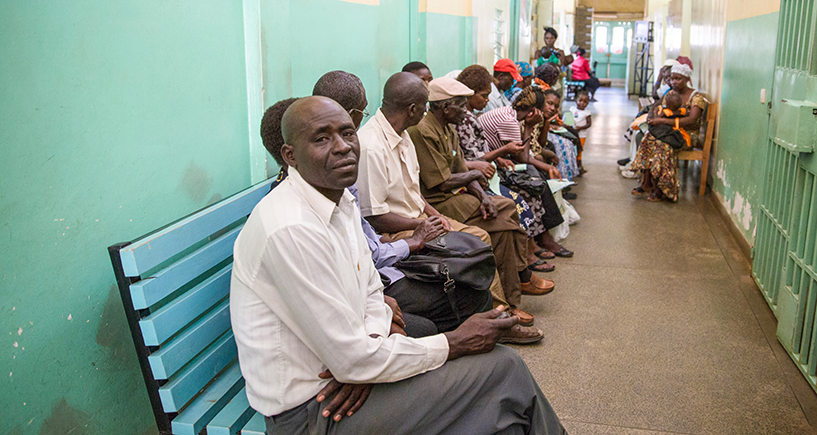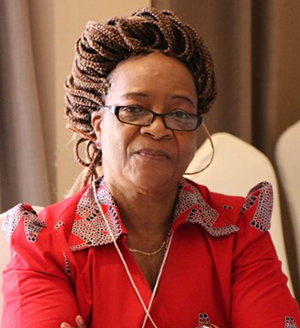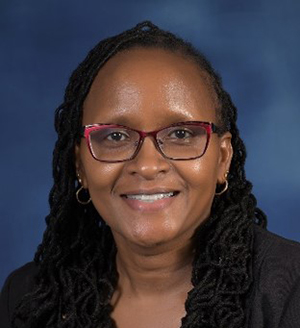Addressing the Challenge of COVID-19 in Malawi and Kenya
Addressing the Challenge of COVID-19 in Malawi and Kenya

Swift and effective action to address the COVID-19 pandemic has required countries to engage in an all hands on deck approach. We recently asked our colleagues on the frontlines in Malawi and Kenya, Dr. Ann Phoya and Dr. Ndinda Kusu, to share how their teams are working with all sectors of society to scale up preparedness and response measures, strengthen capacities and systems to meet the challenge of COVID-19, and help maintain uninterrupted essential health services.

Dr. Ann Phoya: Deputy Project Director for the ONSE Health Activity in Malawi
Malawi’s health care workers, just like health workers everywhere, are experiencing tremendous strain under COVID-19 and have rightly demanded adequate support and personal protective equipment [PPE] to safely do their jobs. Early in the outbreak, the midwives I work with were frightened to care for mothers in the health center without PPE; they refused to go into work. But our work has to go on. We must do everything possible to ensure that these valued midwives, and all health workers, have the information, supplies, equipment, and skills they need to respond to this crisis while still providing the essential health services they regularly perform to save lives every single day, pandemic or not.
In Malawi, our ONSE team is meeting the needs of health workers in the most direct ways we can. We are working with district health teams to establish infection prevention and control (IPC) measures —including hand washing stations and distancing interventions at health facilities—for both health workers and patients before they enter the health center. We have supported a COVID-19 orientation of laboratory personnel, as COVID-19 testing is established in the nine laboratories that have currently been set up here in Malawi. And we are providing training in IPC, surveillance, contact tracing, and case management to sharpen health workers’ skills in managing patients without spreading the virus to others. Our team has also helped refurbish isolation units at a teaching hospital here in Lilongwe and in one other district to make sure we are ready to receive and care for affected patients while continuing essential services for non-affected patients.
We have also supported contact tracing efforts, visiting communities where confirmed COVID-19 patients reside or have had contact. This has presented real challenges. It’s difficult to convince people who feel well but have tested positive to remain at home. Malawi has been particularly sensitive to misinformation around COVID-19, amplified by the current election season and politicization of the virus. ONSE is collaborating with other USAID partners and the Ministry of Health to support a nation-wide risk communication campaign, aimed at reaching community members with accurate information on the spread and prevention of the virus.
As we’ve learned, community leaders are important entry points for not only information sharing regarding COVID-19 but also contact tracing and testing. In the township of Kaliyeka in Malawi’s capital city, after the death of a COVID-19 patient, contact tracing teams were met with hostility (the team was almost stoned at one point trying to collect samples from confirmed contacts). After trying multiple times to engage with contacts and being refused, it was necessary to regroup and initiate a series of briefings with community block leaders (local neighborhood leaders) on transmission, symptoms, testing, and care seeking for COVID-19. With ONSE’s support, district health teams worked with block leaders, who were then able to sensitize community members themselves, providing essential information and dispelling myths, rumors, and misconceptions. It’s incredibly important to keep building trust within the communities we work—trust in the information we provide, trust in the health services that we are referring them to.

Dr. Ndinda Kusu: Country Project Director, MTaPS Program in Kenya
Here in Kenya, MSH has been working in partnership with the government for more than 25 years, collaborating with numerous players in the public and private sectors, as well as faith-based organizations. These partnerships, which extend from the national government to county health teams to individual health facilities, have gone a long way in helping the MTaPS program fast-track our COVID-19 response.
For example, MTaPS is strengthening and formalizing IPC structures at the county level to better support all health workers—clinicians, nurses, surveillance officers, IPC coordinators, and lab techs—to contain and manage the COVID-19 pandemic. This type of technical assistance includes supporting the development of training materials, IPC guidelines, standard operating procedures for health facilities, job aids, and other informational and communications materials. Our training-of-trainers courses in 33 counties have further helped scale up this capacity building to sub-county health facilities.
And our reach to more health workers grows daily. MTaPS is supporting the faith-based sector through the Kenya Conference of Catholic Bishops, the Christian Health Association of Kenya, and the Supreme Council of Kenya Muslims by distributing COVID-19 IPC materials to their network of member hospitals and health workers. Our county-supported trainings have also worked with health care workers drawn from faith-based organizations.
We’ve seen great collaboration with other donors and implementing partners. We are really pleased to see the training packages and the IPC materials we’ve jointly developed with the Ministry of Health and other IPC partners being utilized by the CDC, UNICEF, GAVI, WHO, the Red Cross, USAID partners, and others, reaching many more Kenyan health care workers with the information they need to protect themselves and their patients from COVID-19 infection.
The MTaPS response is extensive. In the Philippines, MTaPS is taking an innovative approach to health worker training, working with the Philippine Department of Health to develop free online trainings, which run twice a week, covering infection control, supply chain management, and health care waste management for COVID-19. To date, more than 7,000 health care workers across the Philippines have participated, and we believe that this education will go a long way to stop the spread of COVID-19 and formalize sound infection control structures in the countries that MTaPS supports.
COVID-19 poses a significant threat to the vulnerable health systems in Malawi and Kenya and other countries where MSH works. MSH’s frontline efforts, global footprint, and strong country and local relationships ensure rapid support for the immediate, coordinated actions, as described by Drs. Phoya and Kusu, needed to prepare, respond, and recover from COVID-19.
The Organized Network of Services for Everyone’s (ONSE) Health Activity, USAID’s flagship program for health service delivery in Malawi, is supporting the national response to the COVID-19 pandemic across 16 districts, where more than 60% of Malawi’s population resides.
The USAID Medicines, Technologies, and Pharmaceutical Services (MTaPS) Program is currently responding to COVID-19 in 13 high-risk countries, where we have ongoing work to contain antimicrobial resistance as part of the Global Health Security Agenda.